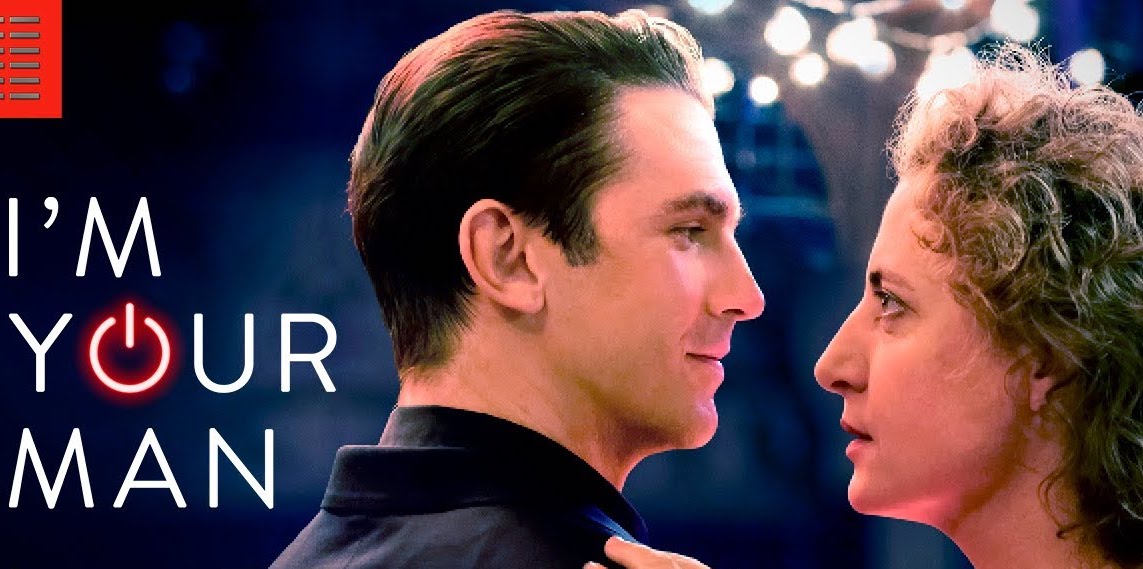Review: Dan Stevens Is an Android Dreamboat in I’m Your Man
4.5 out of 5 stars.


Many films are outright desperate to speak to our times, but Maria Schrader’s Berlin-set sci-fi romcom I’m Your Man could genuinely lay claim to that and more. It’s certainly very much of our current moment, as it depicts an unsettlingly possible near future, covering the type of ground Spike Jonze couldn’t even begin to imagine in Her.
Alma (Maren Eggert) seems like the ideal person to meet the very unusual challenges inherent in her situation. Being a scientist, her mindset naturally leans toward a kind of (mostly) healthy skepticism, which seems to make her more than equipped to evaluate Tom (Dan Stevens), one of the first of a new line of humanoid cyborgs whose sole purpose is to be the perfect partner for whatever human they’re paired with. Her report will determine whether these new, incredibly lifelike machines will have any rights in the new world such beings would no doubt usher in.
Setting aside the inherent immorality of denying basic rights to creatures which are created to cater to our every need, Schrader takes care to show the meticulous crafting behind such a concept, from the information painstakingly gathered from each human beforehand to the equally painstaking efforts to create the perfect romantic setting for them to meet the finished product, which even includes holograms of seemingly contented couples in a retro-themed ballroom.
But the rest of the film is a kind of rebuttal, a complex explanation for how little such knowledge will ultimately matter. Such a safe, easy route to romance and happiness would be seductive at any time in human history, so how could it be anything less in our detached, isolated era? Tom isn’t just the perfect date; he is, indeed, the kind of dreamboat romcoms are made of. Tailored to Alma’s every conscious and unconscious need and programmed to place her happiness above all else, he isn’t just incapable of being selfish, but giving her any reason for jealousy.
How could love not follow, even if Alma is very aware of the role Tom’s algorithm plays in it all, from his behavior to how his consideration extends to giving her illusions of humanity such as sleep and snoring. It’s nearly indistinguishable from what we consider true love, that ever-elusive animal humans have been chasing since we became humans and began longing for that other half that would make us feel whole.
Few actors could also make such a case for Tom being far more than the sum of his intended purpose like Dan Stevens, who is equally capable of unsettling as seducing. So pitch perfect is he that when his perfection is interrupted by moments that reveal a certain artificiality, it becomes part of his charm. As he (often comedically) learns how to better emulate and empathize with Alma and the more baffling aspects of being human, the movie’s lack of interest in exploring the unfairness of his situation becomes an injustice. Tom may be capable of giving love and happiness to the human he’s paired with, but he also doesn’t get to choose who he bestows such devotion to, and it feels like a deep loss.
Schrader’s long career as an actress and, more recently, as an acclaimed director, no doubt gave her a feel for all the nuances of performance in our ideas of romance that allow her to capture it so exquisitely. It’s also a much-needed female perspective on a subject that tends to prioritize a male one, which tends to undermine any gender commentary they try to make, as was the case for Ex Machina and its ultimately reductive view of the innately deceptive nature of its female robot.
The ending also allows for a surprisingly complex conclusion, one that acknowledges the wildly illogical nature of love itself. Just enjoy it before the inevitable American remake, one which I very much doubt will do its origins justice.
(image: Bleecker Street)
Want more stories like this? Become a subscriber and support the site!
—The Mary Sue has a strict comment policy that forbids, but is not limited to, personal insults toward anyone, hate speech, and trolling.—
Have a tip we should know? [email protected]